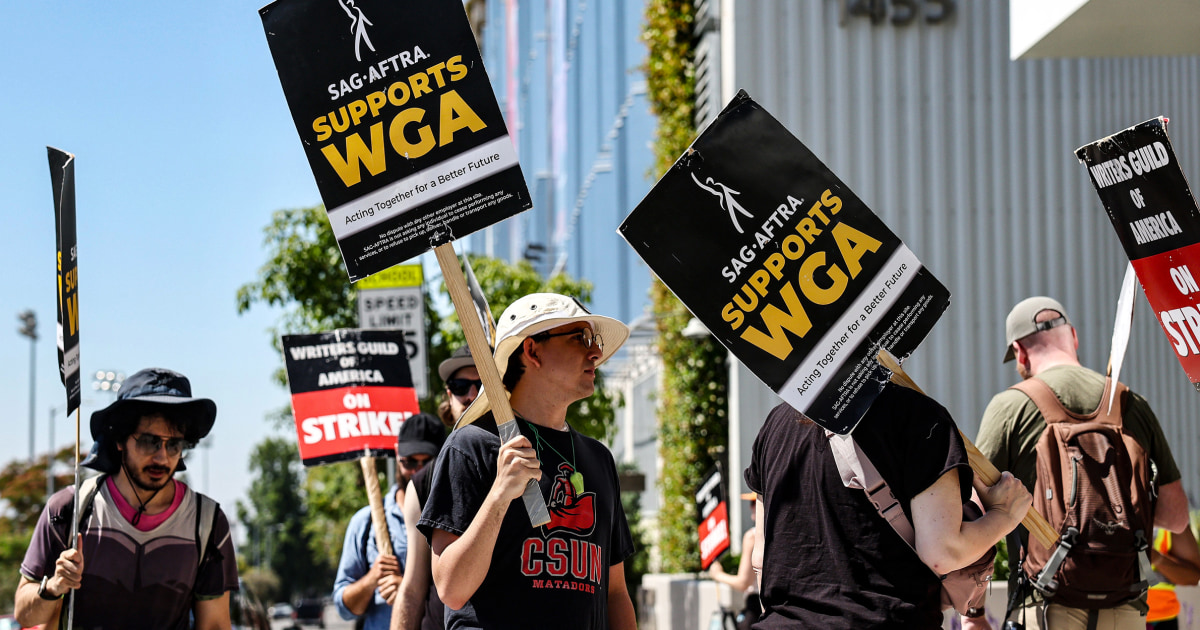
LOS ANGELES — Hollywood’s film and television assembly line could soon grind to a halt.
Thousands of screenwriters have been on strike for more than two months, and they could soon be joined on the picket lines by thousands of actors represented by the Screen Actors Guild-American Federation of Television and Radio Artists, or SAG-AFTRA, a labor union whose members include some of the most famous faces in the entertainment industry.
The stage for a SAG-AFTRA strike was set late Wednesday when high-stakes negotiations between the guild and a trade association representing the film and television industry’s top studios broke down. The existing contract between the two sides expired at 11:59 p.m. PT, following an extension from June 30 to allow for more talks.
SAG-AFTRA’s national board planned to vote Thursday morning on whether to go on strike, and the guild will hold a news conference at 3 p.m. ET.
Hollywood’s actors and writers have not been on strike simultaneously since 1960, when John F. Kennedy was running for president, “Gunsmoke” was the top-rated series on U.S. television, and stars like Elizabeth Taylor lit up cinema marquees.
Here’s what you need to know about the issues at the center of the fight — and how it could shape what you watch.
Who are the key players?
The dispute pits SAG-AFTRA against the Alliance of Motion Picture and Television Producers, or AMPTP, a trade association that represents behemoth entertainment corporations such as Disney, Netflix, Paramount and Warner Bros. Discovery. (The group represents NBCUniversal, the parent company of NBC News.)
SAG-AFTRA was formed in 2012 after the merger of the Screen Actors Guild (founded in 1933) and the American Federation of Television and Radio Artists. The combined guild represents roughly 160,000 performers, from Oscar-winning A-list stars, such as Tom Hanks and Meryl Streep, to radio personalities and television presenters.
The president of SAG-AFTRA is Fran Drescher, best known for playing the title role on the CBS sitcom “The Nanny.” She was elected to lead the union in September 2021.
What do the actors want?
SAG-AFTRA’s members are seeking a new contract with the AMPTP, an agreement that they believe must account for the economic realities of the streaming revolution and the risks posed by emerging digital technologies.
The guild would like increased performer base compensation, which union leaders say has declined dramatically as entertainment companies pivot away from paying out residuals, a type of royalty that was more common when popular shows were sold into syndication instead of banked exclusively on streaming services.
SAG-AFTRA’s members are also alarmed by the rise of artificial intelligence, such as tools that could create digital composites of popular stars. The guild has called for tighter regulations and safeguards to help protect actors “against the unauthorized use of their voices, likenesses and performances.”
Drescher addressed these concerns in a letter to SAG-AFTRA members overnight, writing in part that her team was fighting for the performers “on whom this industry relies.”
“As you know, over the past decade, your compensation has been severely eroded by the rise of the streaming ecosystem,” she wrote. “Furthermore, artificial intelligence poses an existential threat to creative professions, and all actors and performers deserve contract language that protects them from having their identity and talent exploited without consent and pay.”
The writers’ complaints closely parallel those of Hollywood’s screenwriters, who have been on strike since early May after talks between the Writers Guild of America, or WGA, and the AMPTP failed. The industry’s screenwriters, for example, fear that generative AI programs like ChatGPT could one day be used as a substitute for their human labor.
What do the studios say?
When it became clear late Wednesday that negotiations were going nowhere and a strike was more likely, the AMPTP said it was “deeply disappointed” and accused SAG-AFTRA of walking away from the talks.
“This is the Union’s choice, not ours,” the group said in a statement. “In doing so, it has dismissed our offer of historic pay and residual increases, substantially higher caps on pension and health contributions, audition protections, shortened series option periods, a groundbreaking AI proposal that protects actors’ digital likenesses, and more.”
“Rather than continuing to negotiate,” the group added, “SAG-AFTRA has put us on a course that will deepen the financial hardship for thousands who depend on the industry for their livelihoods.”
In an interview with CNBC that aired Thursday, Disney CEO Bob Iger — one of the most powerful executives in American media — said actors and writers alike were not being “realistic” in their expectations.
“It’s very disturbing to me. We’ve talked about disruptive forces on this business and all the challenges we’re facing, the recovery from Covid, which is ongoing, it’s not completely back,” he said in part. “This is the worst time in the world to add to that disruption.”
In recent days, entertainment industry workers on social media expressed dismay over a quote published by the trade publication Deadline that was attributed to an unnamed studio executive. “The endgame,” the executive was quoted as saying, “is to allow things to drag on until union members start losing their apartments and losing their houses.”
What does this mean for you?
The effects of the WGA strike can already be felt across the entertainment landscape. When the writers headed to the picket lines, production on many small-screen productions shut down and late-night talk shows (which rely on topical monologues and segments scripted by full-time staff members) were sent into reruns.
The actors strike would deepen the impasse, upending the film and television release calendar. TV networks are expected to lean heavily on unscripted programs (like reality shows) that had been stockpiled ahead of the writers strike, and the SAG-AFTRA walkout could force big-budget movie sets to go dark until a new agreement is reached.
If a SAG-AFTRA strike is formally approved, everyday consumers of pop culture may also notice that recognizable stars pull back from promoting their projects because that form of publicity would be barred. The looming strike raised questions about whether the cast of the Christoper Nolan historical drama “Oppenheimer” would appear at the film’s London premiere Thursday, for instance.
Source: | This article originally belongs to Nbcnews.com










